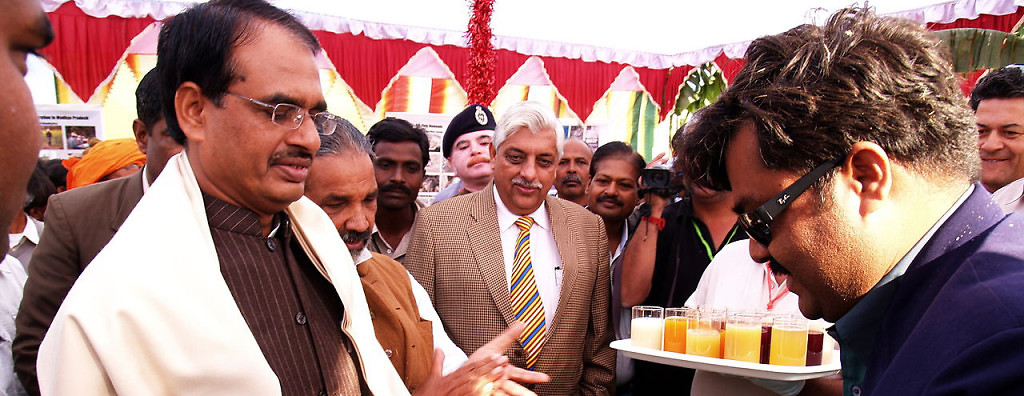When representatives of farmers and activists demand farm loan waiver, they are countered with the arguments pertaining to fiscal prudence, responsible behavior, stability of the financial system, and moral hazard. All valid arguments no doubt. But their validity gets questioned, and rightly so, when it is pointed out that big corporations also get waivers from the same (mostly state-owned) banks—except that the terms used for them are fanciful and disingenuous like ‘corporate debt restructuring’ and ‘strategic debt restructuring.’ So, is waiving off farm loans okay? The answer is a big ‘no’: all waivers are invalid, whether to powerful industrialists or ordinary farmers. What’s sauce for the goose is sauce for the gander.
Evidently, in their zeal to win Assembly elections in Uttar Pradesh at any cost, Prime Minister Narendra Modi and Bharatiya Janata Party president Amit Shah, the Big Two of the ruling dispensation, decided in their wisdom to promise farm loan waiver. Now, farmers or anybody asking for such a favor is making an unjust demand: why don’t you repay a loan? Accepting that is equally bad; it is appeasement, something the likes of Modi and Shah are not averse to. So, Chief Minister Yogi Adityanath redeemed the pledge of his party. It won him and his party plaudits from certain sections, but also opened the floodgates of demands in other states.
For appeasement is an always-hungry monster; it has to be fed all the time, and fed more and more, for its appetite gets whetted rather than sated by its diet. Unsurprisingly, the demands are becoming more vociferous and vehement by the day. Maharashtra Chief Minister Devendra Fadnavis has already succumbed to the rampaging monster; he has announce to forego loans of Rs 30,000 crore owed by farmers with up to five acres of land by October 2016.
Madhya Pradesh Agriculture Minister Gauri Shankar Bisen has ruled out a loan waiver, but you never know with Chief Minister Shivraj Singh Chouhan. A sanctimonious demagogue, he might oblige the agitation leaders at the expense of the exchequer.
According to an estimate, if all states forego farm loans, they would lose over Rs 2.5 lakh crore. Now, that’s a lot of money. It will surely play havoc with states’ fiscal numbers. According to the Reserve Bank of India, the total fiscal deficit of states in 2016-17 was in the region of Rs 4.5 lakh crore, or 3 per cent of GDP. That was an improvement from almost Rs 5 lakh crore in 2015-16 (3.6) per cent. In short, if that happens, states’ fiscal deficit will go skywards.
Even if the country were to indulge in such irresponsibility, the desired goal—that is, helping the farmer—would not be achieved. At best, the waiver would be a short-term palliative, and that too not for every tiller; the poorest of them are anyway out of the formal sector. The reason for the failure of waiver as cure is that the problems of Indian agriculture are fundamental, deep-rooted, and structural, most of which are the result of socialist policies that the country has framed and executed since Independence.
Further, if states decide to pay for the farmer, he is expected to become accustomed to government munificence and refuse to pay in the future. This would be a big disincentive for banks to lend to agriculturists—a development contrary to the government’s goal of financial inclusion.
There will always be demands for loan waiver. The latest case is the State Bank of India’s worries about the “highly unsustainable levels” of debt of some telecom companies. The debt to the telecom industry is in the region of Rs 4 lakh crore. SBI chairperson Arundhati Bhattacharya recently wrote to the Telecom Secretary, “The stress in the sector has reached highly unsustainable levels after the entry of new players and launch of free services, which led to erosion of EBITDA (earnings before interest, taxes, depreciation and amortization) of the telecom service providers… The data with us suggests that the total EBITDA of the telecom sector on an annualized basis is Rs 65,000 crore, which is clearly unsustainable for debt of more than Rs 4 lakh crore.“
She sought fiscal sops for the sector so that banks like hers are protected. She has been accused of double standards, for she had criticized the UP government’s farm loan waiver in March. She was not alone in this assessment, though; RBI Governor Urjit Patel and Nabard chairman Harsh Kumar Bhanwala also opposed the relief to farmers.
The long and the short of it is that if government at any level is involved in arranging debt to industrialists, farmers, etc., there would always be pressure to provide relief to the troubled debtors: the pressure of populism, the politician-businessman nexus, and so on. Whatever the mode of relief—loan waiver or fiscal sops—the burden would be borne by the taxpayer.
As I mentioned earlier in this article, once appeasement starts on this front, holding it back becomes very difficult. If relief can be given to rich industrialists, why cannot it be given to poor farmers? And why cannot it be extended to the humble entrepreneurs and self-employed people in other professions? Why should owner-drivers of taxis be deprived of state munificence? Smaller traders? The beneficiaries of Mudra loans? Home loans to the weaker sections of society?
The way out of this mess is simple: privatization of all public sector banks (PSBs). Controlled by politicians and bureaucrats, they are easily manipulated; loans are often given on extra-commercial considerations; their functioning faces problems like political interference and red-tapism; and the ultimate victim is the taxpayer. Every government comes up with solutions to make them efficient but non-performing assets (NPAs) continue to rise. Despite all efforts, NPAs of PSBs in percentage terms are much more than those of private banks.
Unless all PSBs are sold, the drama of loan waivers will continue unabated.
